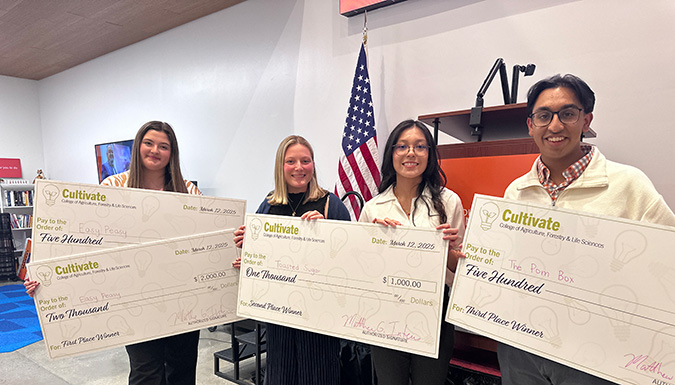Entreprenuership
The College of Agriculture, Forestry and Life Sciences is an active part of the university's entrepreneurial ecosystem—promoting creativity and innovation through select coursework, experiential programs, research endeavors, and Extension programs.
Our students gain experience and mentorship from faculty and business leaders in product innovation, pitch development, strategy, marketing, management, teamwork, business competitions and more. Developing entrepreneurial skills and hands-on business experience provides you with a competitive advantage in the workforce and enriches the next generation of leaders.
“Entrepreneurship and innovation are the bedrock of most products and services we admire. In CAFLS, we foster and provide financial support to students ready to take the leap from concept to creation. By doing so, we equip them with a deep understanding of the entrepreneurial spirit that drives their future employers and potentially their own ventures!”
Dr. Andrew HurleyProfessor
Cultivate
Cultivate aims to encourage Clemson students to develop ideas and explore innovative solutions to cultivate a unique business proposition. Students from the university’s College of Agriculture, Forestry and Life Sciences compete for prizes to help bring their business plan to life.
Cultivate Your Innovation
Brook T. Smith Launchpad
The Brook T. Smith Launchpad is the Entrepreneurship Hub of Clemson University. It offers free membership to students, faculty and staff to engage in entrepreneurial education, networking and support to launch their businesses or pursue support careers in the State, National and Global entrepreneurship ecosystem.
Entrepreneurship Minor
An Entrepreneurship Minor is available to undergraduate students in disciplines across campus. This set of courses is intended to serve those students who desire to supplement their undergraduate degree with expertise related to accounting, finance, management, new product development, and commercialization of inventions. See the Undergraduate Catalog for more information.
Other Resources
There are many resources available outside of CAFLS and Clemson University. From accelerators and incubators to angel investors to business development counseling, see what support South Carolina offers to budding entrepreneurs!


